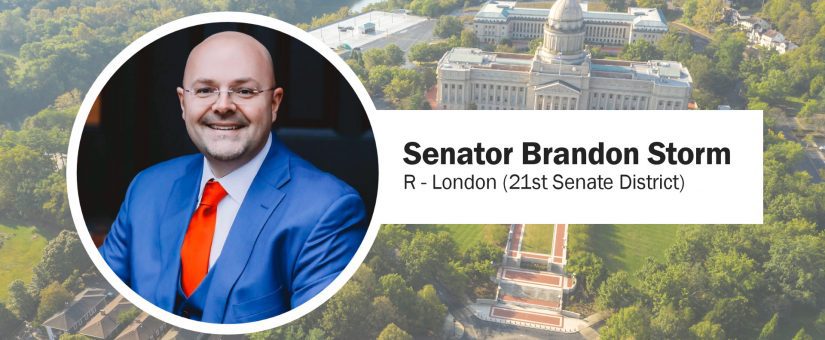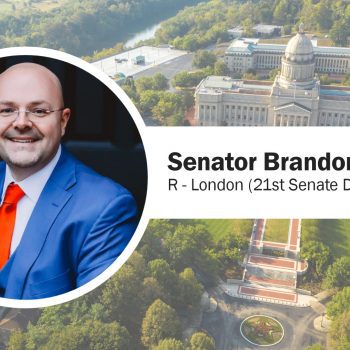
Senator Brandon Storm’s Legislative Update (3/19/2021)
The 30-day session of the Kentucky General Assembly has reached another milestone as we now enter into the veto period. Two more days of session are reserved for March 29 and 30 to allow lawmakers to consider passing additional legislation, and most importantly, to have time to override any vetoes of any bills that have already passed. In this week’s legislative update, I want to outline some of the most prominent legislative measures that are likely to become effective this year.
Before I begin, however, I want to say that I was honored to attend the Cornerstone Laying Ceremony at the Estill County Area Technology Center in Irvine. The Cornerstone Laying Ceremony is a long-standing tradition among Free and Accepted Masons to establish and invoke peace and prosperity to government offices as they serve their respective communities. I appreciate the Grand Lodge of Kentucky F. & A.M.; Ernest Jackson, Grandmaster; all Masons in attendance; Estill County Superintendent Saylor; members of the Estill County School Board; and members of the community who came together to participate in the ceremony.
The elephant in the room this year has been the need to enact another one-year budget. As a reminder, budgets are traditionally passed every two years, but with last year’s uncertainty brought on by COVID-19, only a one-year budget was enacted. Therefore, another is required for this session. All that is left to do now is await the governor’s decision to either sign or veto the budget bill. If vetoed, the General Assembly will override his veto upon our return to Frankfort on March 29.
The budget that was enacted is a continuing budget taking a careful and conservative approach as we continue to navigate the uncertainty of COVID-19. The state has received a lot of one-time dollars from the federal government through the Coronavirus Aid, Relief, and Economic Security (CARES) Act and the most recent federal stimulus package. Due to these injections of federal funds into our society’s various sectors, the economic outlook and state revenue may be artificially inflated. There is no sure way of knowing what state revenues or the economy will look like once there is no stimulus money helping to prop things up. It would be financially irresponsible for the state to use one-time dollars to put Kentucky taxpayers on the hook for recurring expenses in future years when we will not lean on federal funds.
An essential aspect of the budget is maintaining legislative authority on the allocation of funds, as required by the Constitution of Kentucky. The bill stipulates that the General Assembly must authorize the use of these monies. Thirty-seven million dollars of federal funds have been designated to provide grants to detect, diagnose, trace, and monitor COVID-19 infections in congregate and vulnerable population settings. Additionally, $10 million in state dollars will go to the School Facilities Construction Commission for schools recently damaged by flooding.
A critical element in the economic growth of our state is people’s access to reliable internet services. Reliable broadband can be the difference in companies determining to locate in our communities. With the reliance on virtual learning for our students this past year, we have seen how a lack of access to internet services only exacerbates Kentucky students’ struggles. Furthermore, as COVID-19 forced us to rely on more virtual services, we have seen growth in telehealth services. Bringing internet access to the areas currently without it can improve our economy, education, and even health outcomes.
With this in mind, the legislature passed House Bill (HB) 320, allocating $250 million of federal money to expand access to broadband connectivity. However, the bill stipulates that no more than $50 million can be spent before April of next year to make sure efforts are deliberate, effective, and will go to the areas of most need. This initial $50 million will get the ball rolling. Legislators will return to session next January to provide ample opportunity to assess the efforts made between now and then to determine the best path forward. The funding will be targeted to utilize existing infrastructure and the experienced workforce through electric co-ops. In reality, the allocated funds will equate to $500 million because the $250 million will be used as matching funds for the projects.
Other bills that have made final passage and will qualify for a veto override should the governor veto them include:
HB 95 aims to help Kentuckians struggling with diabetes by capping the cost of out-of-pocket insulin at $30 for a 30-day supply. It applies to state-regulated, comprehensive, private health insurance plans and the Kentucky employee health plan. It does not apply to Medicare, Medicaid, or self-funded health plans.
For too long, the high cost of insulin has caused patients to ration their supplies, resulting in a loss of life. Others have had to make desperate financial decisions to maintain their access to their insulin. Kentucky ranks eighth in the nation in diabetes prevalence and is the fifth-highest state in diabetes-related deaths. Between 2000 and 2018, the percentage of Kentuckians diagnosed with diabetes doubled. Diabetes can be associated with heart failure, stroke, blindness, and more.
Senate Bill (SB) 8 provides for opting out of mandatory vaccinations for people with religious or conscientiously held beliefs. The bill maintains employer immunization policies for employees of schools, universities, and health care organizations.
House Joint Resolution 77 extends specific COVID-19 regulations an additional 60 days. This joint resolution, which can carry the force of law, will be effective only if the court ultimately rules in favor of the legislature on pending litigation. The governor is challenging HB 1 and SB 1, and SB 2. Those three bills, if upheld, provide the legislature a seat at the table as life-altering executive decisions are made. It is worth noting that Kentucky is the exception to the rule regarding executive authority during a state of emergency. The bills being challenged by the governor would merely bring Kentucky more in line with other states regarding oversight of executive power during times like these.
I want to thank my colleagues who supported the legislative measures that I introduced this year. SB 133 was among them, and it has now been delivered to the governor. Info on the bill can be found in earlier legislative updates or by going to legislature.ky.gov. I have a couple of other bills that can still be passed, and I hope to see that happen. They include SB 131 and SB 215 that related to reorganizations within the Transportation Cabinet to improve safety. There are other measures on religious freedom and pretrial release that I introduced in my first term as your State Senator. I look forward to continuing to work on good legislation to better our state.
Lastly, I had the opportunity to speak to the fifth grade of Bush Elementary School in Laurel County regarding this year’s session. It is excellent to share with our youth the vital work that is being done in Frankfort. I am grateful for their interest. Our future is bright.
It is a true honor to represent Laurel, Jackson, Estill, Powell, Menifee, and Bath Counties in the Kentucky State Senate. If you have any questions about these public policy issues or any other matter of importance to you, do not hesitate to contact my office toll-free by calling 502-564-8100. You can also email me at brandon.storm@lrc.ky.gov. Stay safe. God bless.
Note: Senator Brandon Storm (R-London) represents the 21st District, which encompasses Bath, Estill, Jackson, Laurel, Menifee, and Powell Counties. Senator Storm is the Vice-Chairman of the Senate Transportation Committee and serves as Chairman of the Enrollment Committee. He also serves as a member of the Senate Standing Committees on Economic Development, Tourism, and Labor; State and Local Government; Banking and Insurance; and the Budget Review Subcommittee on Human Resources. Additionally, Senator Storm is a member of the Statutory Committees on Program Review and Investigations; and Child Welfare Oversight and Advisory.
- On March 19, 2021



